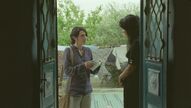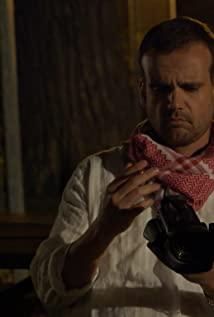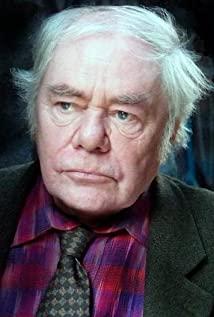What makes Dennis convincing isn't just telling a story well, it's his ability to tell an almost perverted story poignantly. "Scorched Earth" was nominated for the Oscar for Best Foreign Language Film that year. Although it was narrowly defeated by Susanne Bie's "Better World", the "woman who loves to sing" under the muzzle remained deeply in the hearts of the audience.
Incendies French, originally meaning "fire", but the global release (including English-speaking regions) uniformly uses this French term.
Lover was beaten to death by brother, eldest son sent to orphanage, rescued, killed, imprisoned, raped, conceived and gave birth to twins, once faith was swallowed up by revenge in the midst of war, woman who was beaten but still sang . She has no great sentiments, but only a stubbornness loyal to herself and a benevolent heart for her children.
But apart from the historical background, it is difficult to deeply understand and understand the helplessness of this woman named Nawal under the fate.
The civil war in Lebanon, like other conflicts in the Middle East, is full of religious conflicts. All parties, including civilians, have an amazingly firm position but are often full of betrayal and betrayal. It is also common for allies to turn against each other.
Dennis reveals to us these distorted human natures under the war step by step in a synchronized way of forward and reverse sequences. The grown-up twins took the mother's last letter and returned to their hometown to follow the footsteps of their mother Nawal. At the same time, the "singing woman" who survived the war is also constantly into the audience's field of vision.
Nawal's tragedy was doomed from the start, as she, a Christian, fell in love with the son of a refugee (original line). It should not be difficult for anyone familiar with the history of the Middle East to see that the "refugees" in the words of Nawal's brother refer to the Palestinian refugees (believing in Islam) who continue to pour into Lebanon. Nawal's family's disapproval of the relationship was not just religious, but political.
[Lebanon is a magical field, known as a "religious museum" in the world, a small territory with many sects. At the beginning of the founding of the country, Christians accounted for about half of the population, and Islam accounted for the other half of the population. The evenness of the population also created a political balance, with Christians taking a slightly heavier weight. For a long time, Christianity and Islam in Lebanon have been in a very peaceful state. However, the gradually skewed population ratio (the birth rate of Christians is much lower than that of the Muslim population), coupled with the continuous influx of Palestinian refugees into Lebanon, has gradually led the Muslim forces to gain the upper hand and demand more political dominance. 】
The lover was killed, but Nawal was pregnant. Christians in the country are generally more educated and civilized than Muslims. It is because of this that Nawal was able to survive on his brother's gun and gave birth to a son. Nawal's only impression of his son is the one behind his heel. Three dot markers.
After his son was sent away, Nawal went to the center of the city to seek refuge with his relatives to continue his studies. At this time, the two parties in the government had begun to have serious differences over the refugee issue; as a student, Nawal supported refugees despite being a Christian. Because she firmly believes that peace has nothing to do with religion.
[Christianity in Lebanon belongs to a very special group called Maronite. Islam is divided into several factions, Sunnis and Shiites. In addition, there is a special local sect: the indomitable Druze sect (Durze). ]
But the irony is that it was the armed groups of these refugee organizations that attacked the southern Christian village where her son lived, causing all the people in the orphanage to disappear. Christians retaliated by holding and shooting a commercial bus carrying Muslim civilians, including Nawal, whose Christian status saved her life.
In the face of religious conflict, identification is more important than anything else, and good people and bad people are not worth discussing here at all. Nawal tried to pretend to be the mother of the child in the car to save the dying child, but in the end, the child and her mother were shot and died in the fire.
[This event actually existed in history. On April 13, 1975, in retaliation for Palestinian guerrillas attacking Christian churches, the Falang Christians ambushed a bus carrying 26 Palestinians (including guerrillas) and killed all its passengers, which triggered Lebanon. A long and brutal civil war. ]
Nawal, who witnessed this tragedy, was completely disappointed with his religion and lost his confidence in the government. He even assisted the refugee organization to shoot and kill the leader of the right-wing Christian militia who was in power at the time.
[When Palestinian refugees keep pouring into Lebanon, the government prefers to keep the refugee problem invisible and isolate them. But as the number of refugees grew, the isolation had unintended consequences: Armed struggles began after Arafat's Palestine Liberation Organization (PLO) entered Lebanon in the 1970s. The PLO has to fight not only Israel but also the Lebanese government. The Lebanese government suddenly found that there was no way to control these pervasive guerrillas. 】
Nawal was imprisoned for 15 years and tortured. The only one who could support her to continue to live was the son whose life and death were unknown. Prison guards went to all lengths to fight her, sending Abou Tarek, known for his torture of prisoners, who sexually assaulted Nawal multiple times and gave birth to twins.
[The 15-year-long Lebanese civil war was a battle involving quite a number of forces, not just an armed conflict between Christian and Islamic + Palestinian guerrillas in the country, including the connivance and garrison of Syria, the invasion of Israel (p. 5 Middle East wars), and foreign powers such as the United States, France and Italy that intend to control Lebanon. Domestic gangs and the military continued to ally and defect between different forces, and it was not until the "Greater Beirut" plan in October 1990 that the real civil war ended. 】
After the civil war, the former Islamic forces assisted Nawal to immigrate to Canada with the twins to start a new life. Here, she found her son whom she had never met, and also met Abou Tarek, who raped and tortured her. It's just that sometimes, one plus one doesn't necessarily equal two. The few short lines written in Nawal's posthumous letter at the end of the film allowed the protagonists who lived in the tragedy of war to gain a kind understanding. And for her twins, Nawal has gone out of her way to get them to accept the fact that everyone in the war can't help themselves, don't blame yourself for factors beyond your control.
Because under the war, it is really not helpless.
View more about Incendies reviews










